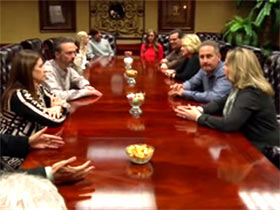TIM O’BRIEN, correspondent: The case was brought by Hobby-Lobby, a national chain of craft stores owned by a devoutly Christian family. The family objects to provisions in the Affordable Care Act that require them to provide insurance coverage for contraception methods that they view as tantamount to abortion—such as the “morning after pill.”
STEVE GREEN (President, Hobby Lobby, Inc.): This is an issue of life. We cannot be part of taking life, and so to be in a situation where our government is telling us that we have to be is incredible.
O’BRIEN: Hobby Lobby relies heavily on a 1993 law called the Religious Freedom Restoration Act, landmark legislation that states that the federal government “shall not substantially burden a person’s exercise of religion” unless it is “the least restrictive means of furthering a compelling government interest.” The court is expected to use the Hobby Lobby case to determine just how much religious freedom the law actually restores—and for whom.
 Supreme Court: “We'll hear arguments this morning in….”
Supreme Court: “We'll hear arguments this morning in….”
When the case was argued last March, the court’s more conservative justices appeared supportive of Hobby Lobby, but others questioned whether corporations like Hobby Lobby have any religious freedom at all:
Justice Sonya Sotomayor: “How does a corporation exercise religion? Where are the cases that show that a corporation exercises religion?”
Justice Anthony Kennedy, often the swing vote in close cases, asked about the religious beliefs of the employees, who may not share the beliefs of the employers:
Justice Anthony Kennedy: “The employee may not agree with these religious—religious belief of the employer. Does the religious beliefs [of the employer] just trumps? Is that the way it works?”
The court’s only female Justices—Ruth Ginsburg, Sonya Sotomayor, and Elena Kagan—seemed most skeptical of Hobby Lobby’s religious arguments:
Justice Elena Kagan: “The Congress has made a judgment, and Congress has given a statutory entitlement, and that entitlement is to women and includes contraceptive coverage, and when the employer says, ‘No, I don’t want to give that,’ that woman is quite directly, quite tangibly harmed.”
At the heart of the case: just how far does the Religious Freedom Restoration Act reach?
Justice Sonya Sotomayor: “Is your claim limited to sensitive materials like contraceptives, or does it include items like blood transfusions, vaccines?”
Justice Elena Kagan: “There are many people who have religious objections to vaccinations. What happens then? So another employer comes in and that employer says ‘I have a religious objection to sex discrimination laws.’ And then another employer comes in, ‘I have a religious objection to minimum wage laws,’ and then another—family leave, and then another—child labor laws.”
Not specifically mentioned in the court’s arguments, but very much on the line in this case: gay rights. While many cities prohibit discrimination based on sexual orientation, accommodating gays and lesbians may violate the religious convictions of some employers and landlords. What happens then?
When Congress passed the Religious Freedom Restoration Act, it explained that courts were to strike what it called “a sensible balance between claims for religious liberty and the interests of government.” “A sensible balance”: Easier said than done, as Monday’s decision in this divisive case is all but certain to demonstrate.
For Religion & Ethics NewsWeekly, I’m Tim O’Brien at the Supreme Court.

 Supreme Court: “We'll hear arguments this morning in….”
Supreme Court: “We'll hear arguments this morning in….”

